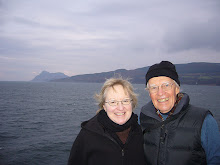The Transformation Team is a group of ten employees -- both Christian and Muslim -- who support the projects of the Priority Areas. Each of the ten specializes in some aspect of community development. For example, Andy Whittet is a community profiler. When a local congregation or a community group in one of the Priority Areas seeks the help of the Transformation Team, after a series of meetings with residents of that area to determine that the Transformation Team is an appropriate group to work with them, Andy does an in-depth demographic study of that area to help the local congregation better understand the community in which they are located. The 35-page profile that Andy showed us for the area where Gayle and I are living, details data and analysis of the age, education, religion, employment, income, housing costs and the health of the residents of the area. This is an invaluable resource to any congregation that wants to determine the needs of the community they would like to serve. They are helped is this assessment by other members of the Transformation Team. When finally the local congregation decides what they would like to do to improve the quality of life in their neighborhood, a consultant is hired to do a feasibility study -- an action plan to achieve their goals. Often, the congregation will need to raise major money to meet these goals. One of the functions of the Team is to help the local group raise funds. Regular workshops are held throughout the city using the title "Fit for Funding," led by Team member David Zabiega, to help the local group prepare the proposal and locate sources of funds. I'll be writing more about this whole process after we see it in action.
Friday, September 28, 2007
Sunday, September 23, 2007
PRIORITY AREAS / SCOTLAND
The faith community throughout
Later at the forum, each guest from church headquarters in Edinburgh was asked to consider two ways that their departments could establish programs to help rid the country of the scourge of poverty, and to pledge to the group that they would follow up with these programs. On hearing the list, the poor people promised that they would be visiting the guests in a few weeks to monitor progress. Clearly they are becoming a force to be reckoned with in the society and will not be still until they see positive change.
I think I first heard it from Willie Baptist, Poverty Scholar in Residence, at Union Theological Seminary in
